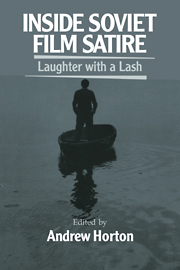Book contents
- Frontmatter
- Contents
- Foreword: If life itself is a satire …
- Acknowledgments
- Editor's note
- Introduction: Carnival versus lashing laughter in Soviet cinema
- Part One The long view: Soviet satire in context
- Part Two Middle-distance shots: The individual satire considered
- VI A subtextual reading of Kuleshov's satire The Extraordinary Adventures of Mr. West in the Land of the Bolsheviks (1924)
- VII The strange case of the making of Volga, Volga
- VIII Circus of 1936: Ideology and entertainment under the big top
- IX Black humor in Soviet cinema
- X Laughter beyond the mirror: Humor and satire in the cinema of Andrei Tarkovsky
- XI The films of Eldar Shengelaya: From subtle humor to biting satire
- Part Three Close-ups: Glasnost and Soviet satire
- Filmography
- Contributors
- Index
VII - The strange case of the making of Volga, Volga
Published online by Cambridge University Press: 07 October 2009
- Frontmatter
- Contents
- Foreword: If life itself is a satire …
- Acknowledgments
- Editor's note
- Introduction: Carnival versus lashing laughter in Soviet cinema
- Part One The long view: Soviet satire in context
- Part Two Middle-distance shots: The individual satire considered
- VI A subtextual reading of Kuleshov's satire The Extraordinary Adventures of Mr. West in the Land of the Bolsheviks (1924)
- VII The strange case of the making of Volga, Volga
- VIII Circus of 1936: Ideology and entertainment under the big top
- IX Black humor in Soviet cinema
- X Laughter beyond the mirror: Humor and satire in the cinema of Andrei Tarkovsky
- XI The films of Eldar Shengelaya: From subtle humor to biting satire
- Part Three Close-ups: Glasnost and Soviet satire
- Filmography
- Contributors
- Index
Summary
Once upon a time, the KGB came to Aesop and got him by the ass. The meaning of this fable is clear; we don't need such fables!
The musical comedy Volga, Volga holds a special place in the history of Soviet film. According to official histories, it is one of the best film comedies, having been awarded Stalin's Award of the First Degree. When reviewing the history of Soviet film, we see that this picture exemplifies the type of Stalinist propaganda film that illustrates the slogan “Life became better, life became more joyful.” And though Volga, Volga does not arouse as much passionate controversy as the notorious Cossacks of the Kuban (1950) directed by Ivan Alexandrovich Pyriev, it comes very close.
In the case of Volga, Volga, there are two absolutely aggravating circumstances. First there is, apparently, Stalin's personal order, about which G. Alexandrov, with his usual naïveté (or something much worse) reported to a correspondent of the evening newspaper Vercherajaya Moskva, “After our films Happy Guys and Circus our task was to create a film comedy without any romantic and melodramatic distractions.” If we take into account that the work on the film started in 1936, that it was distributed in 1938, and that Stalin's award was given in 1941, the meaning of Stalin's order becomes clear.
- Type
- Chapter
- Information
- Inside Soviet Film Satire , pp. 75 - 82Publisher: Cambridge University PressPrint publication year: 1993

